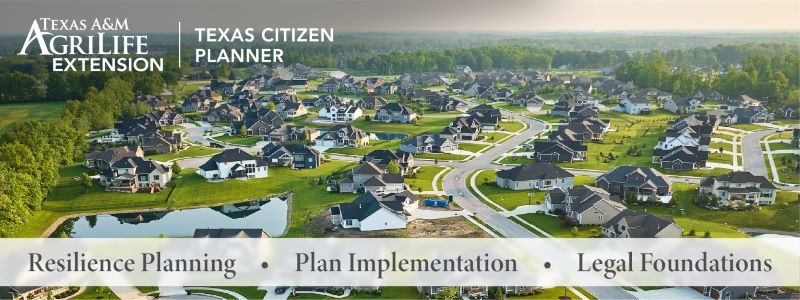Texas Citizen Planner: April 23 – May 28, 2025
April 23: Introduction to Planning
Background and History: What are the key elements of planning history and theory that continue to inform citizens, planners, and local officials to provide broad context for planning and help in the decision-making process?
Fundamentals and Key Concepts: The session provides an overview of the planning profession by exploring what planning is, why it is done, who it serves and how it is carried out. It begins by explaining the purpose of planning, clarifying what is planned and highlighting the shared origins and evolving nature of planning to address specific local challenges. The session then covers who planning serves, focusing on the role of elected and appointed officials in engaging with the public and guiding the planning process. Finally, the session explores how planning is accomplished, emphasizing the tools, resources and methods used to create and assess the impact of projects and policies.
April 30: Implementing Green Infrastructure
Introduction to Green Infrastructure: This class will demonstrate how green infrastructure can help communities save money, create natural amenities, reduce flooding and preserve quality of life. Case studies will illustrate opportunities for implementation.
Incorporating Green Infrastructure into Community Regulations: An examination of the process of creating community regulations and the legal issues involved. Green infrastructure requirements will be used as an example.
May 7: Keynote Address and Contemporary Issues in Planning
Beyond the Blueprint, Navigating Texas Urban Planning Through Multiple Lenses: From her experience as a Community Member, Consultant, Staff, Zoning Commissioner, City Councilwoman and Community Advocate, Ann Zadeh explores her experience with planning through multiple lenses. Topics will include creating comprehensive plans, dealing with zoning, zoning reform, transportation, affordable housing, community engagement, all within the boundaries of local jurisdictions, and confines of state legislation.
Contemporary Issues in Planning: This class will examine certain contemporary issues as reflected in the mission priorities of national organizations, such as the American Planning Association and the Urban Land Institute. These issues, which are generally broad and complex, revolve around sustainable development, housing affordability, and social equity. While the issues tend to be global in scope, we can often address them most effectively at the local level, and citizen planners can play meaningful roles in those efforts.
May 14: Resilience and Planning Implementation
Planning Implementation: This class covers a mix of municipal powers like PUDs, subdivision ordinances, and site plan review. These tools are routinely used to implement planning recommendations, and they offer opportunities for localities to address concerns regarding land uses, building setbacks, design standards, signage, walkability, parking, circulation, stormwater, and landscaping.
Resilience Requires Partnership: This class explains the flood control management system in the greater Houston area, and how a partnership between all the entities involved is required to create a healthy and resilient environment and region. This presentation will provide the audience with an opportunity to understand how the project planning effort supported an integrated and holistic approach, identifying and planning for these challenges up front. This approach can be replicated for use in other project areas throughout the country.
May 21: Legal Foundations of Community Planning
Module I: Planning officials, commissioners, or councilpersons have a range of important duties. Learn their roles and the groups they will work with on local planning matters, as well as procedural issues, conflicts of interest, and ethics.
Module II: A look at the Texas law and the United States Constitution covering the legal basis and limits of planning power. The class will also cover definitive court cases and enabling statutes that outline local planning authority, including issues related to takings and due process
May 28: Scenario Planning/CHARM Exercise
Scenario Planning: How has the idea of “exploratory scenario planning” has emerged in recent years and how it compares to the more traditional “normative scenario planning” and what are the benefits of both? How can exploratory scenario planning combine with interactive mapping to help communities promote resilience?
CHARM Exercise: This exercise involves a series of interactive mapping exercises to show how the CHARM (Community Health and Resource Management) platform can help identify risks, vulnerabilities, and challenges for a community.



